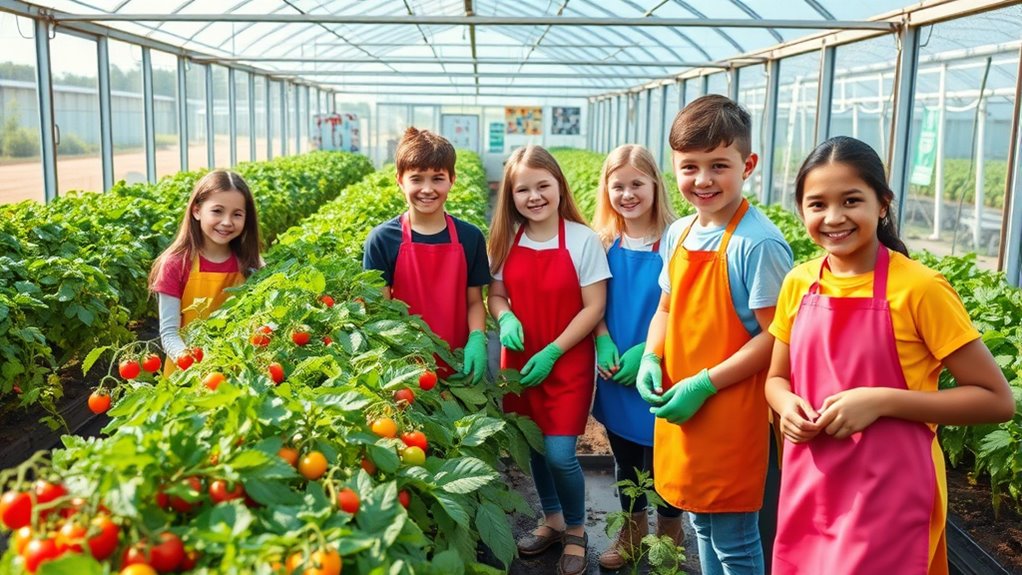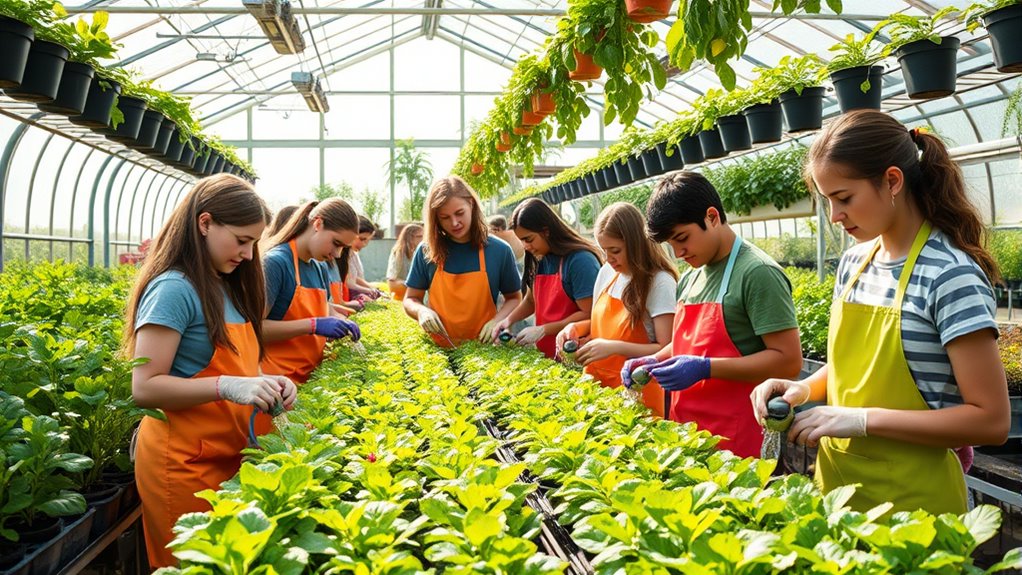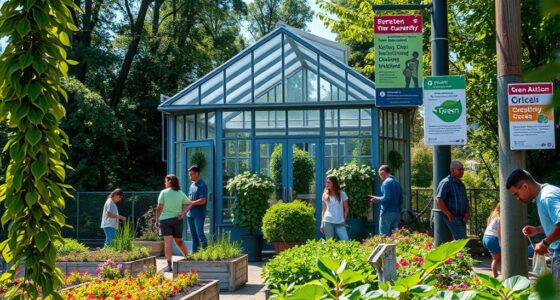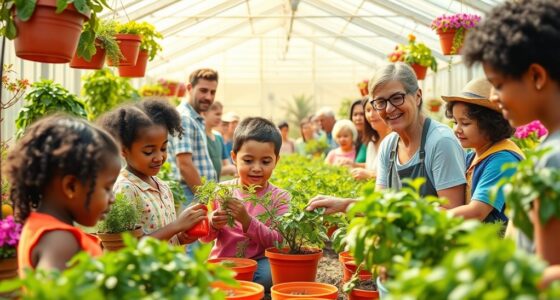Greenhouse projects are great platforms for you to develop leadership skills while making a real community impact. You can learn sustainable farming methods, encourage resource conservation, and promote eco-friendly practices. By organizing workshops or planting days, you gain teamwork, planning, and communication skills. These projects empower you to inspire others and influence local change. Keep exploring how these initiatives build confident, responsible youth leaders who shape greener, healthier communities—you’ll find many ways to get involved.
Key Takeaways
- Greenhouse projects serve as hands-on platforms to develop youth leadership, community engagement, and sustainable farming practices.
- They teach resource-efficient, organic farming techniques, fostering environmental awareness among young people.
- Such projects build community bonds, encouraging collaboration among residents, schools, and local authorities.
- They enhance youth skills in planning, teamwork, communication, and problem-solving through real-world experiences.
- Greenhouse initiatives promote healthier environments and empower youth to lead sustainable change in their communities.

Have you ever wondered how young people can drive meaningful change in their communities? One powerful way is through greenhouse projects, which serve as hands-on platforms for youth leadership and community engagement. These projects do more than just grow plants; they inspire sustainable farming practices that can transform local food systems and foster environmental responsibility. When you get involved in a greenhouse initiative, you’re not just cultivating vegetables or flowers—you’re nurturing a sense of ownership and empowerment within your community. This kind of active participation encourages others, especially fellow youth, to see how their actions can make a real difference.
Greenhouse projects act as catalysts for sustainable farming. They teach young people about efficient water use, organic growing techniques, and resource conservation—all essential components of sustainability. By learning and practicing these methods, you help promote environmentally friendly food production that reduces reliance on harmful chemicals and minimizes waste. As you develop expertise, you can share this knowledge with community members, making the project a local hub for sustainable farming education. This ripple effect benefits everyone, creating a more resilient and eco-conscious community. Furthermore, frost-free freezers often incorporate innovative solutions like composting and renewable energy, reinforcing the importance of sustainable living.
Greenhouse projects promote sustainable farming through water conservation, organic methods, and innovative solutions like composting and renewable energy.
Community engagement is at the core of successful greenhouse initiatives. When you lead or participate in these projects, you build bridges between different groups—local residents, schools, businesses, and local authorities. You become a voice for youth, demonstrating that young people are capable of leading change. Through organizing workshops, planting days, and educational events, you foster a sense of collective responsibility. This not only strengthens community bonds but also encourages others to join in and contribute their skills and ideas. As a young leader, your enthusiasm and fresh perspective can inspire more participation, making the project a shared effort rather than a top-down initiative.
Additionally, greenhouse projects offer real-world leadership experiences. You gain skills in planning, teamwork, problem-solving, and communication. These are essential for future civic involvement and career development. As you see tangible results from your efforts—healthy plants, community members learning new skills—you realize the impact of your leadership. This motivates you to take on more projects, advocate for sustainable practices, and deepen your engagement. Over time, your involvement can influence local policies and inspire other youth-led initiatives, amplifying your community’s capacity for positive change.
In essence, greenhouse projects are more than just about growing plants—they’re about growing leaders who understand the importance of sustainable farming and community engagement. When you step into this role, you’re helping shape a healthier environment and a more connected, proactive community.
Frequently Asked Questions
How Can I Start a Greenhouse Project in My Community?
Start by engaging your community to gather support and ideas. Find a suitable location and secure necessary permits. Plan your greenhouse with sustainable practices in mind, such as rainwater harvesting and eco-friendly materials. Recruit volunteers or local youth groups to help build and maintain it. Promote your project through social media and community events to inspire others. Your initiative can foster leadership, education, and environmental awareness in your neighborhood.
What Age Group Benefits Most From Youth Greenhouse Leadership?
Imagine planting seeds of change—teen leadership and middle school engagement flourish best here. You’ll notice middle schoolers, with their boundless curiosity and energy, thrive in greenhouse projects, becoming the roots of future leaders. Teens, reaching for independence, develop essential skills through hands-on experience. This age group benefits most because their growing minds are eager to nurture responsibility, teamwork, and environmental awareness, making your greenhouse a vibrant classroom of leadership in the making.
Are There Funding Options Available for Youth Greenhouse Initiatives?
Yes, there are funding options available for your youth greenhouse initiatives. You can explore grant opportunities offered by local governments, educational institutions, and environmental organizations to secure substantial funding. Additionally, crowdfunding options like GoFundMe or Kickstarter allow you to raise funds directly from the community and supporters. These options make it easier to gather resources, get your project off the ground, and promote youth leadership through sustainable greenhouses.
How Do Greenhouse Projects Impact Local Environmental Education?
Greenhouse projects boost local environmental education by immersing you in urban farming and climate awareness. You learn sustainable practices firsthand, understanding how green spaces improve air quality and reduce urban heat. These projects inspire you to take action, fostering a deeper connection to nature and the environment. As you participate, you gain essential skills and knowledge, empowering you to advocate for sustainable growth and climate resilience within your community.
What Challenges Do Youth Face in Managing Greenhouse Projects?
Imagine juggling flaming torches while riding a unicycle—that’s how managing greenhouse projects feels. You face resource constraints that drain your energy faster than a caffeine crash. Community engagement can be as elusive as catching smoke; it demands constant effort and patience. These challenges test your leadership skills daily, pushing you to innovate and motivate despite limited resources, all while trying to keep the project from burning out.
Conclusion
By getting involved in greenhouse projects, you become a powerhouse of change, transforming not just plants but entire communities. Your leadership sparks a wildfire of inspiration that spreads faster than wildfire itself, igniting hope in every corner. This experience elevates your potential to legendary status, turning you into a beacon of progress. So, embrace this opportunity wholeheartedly—you hold the power to shape the future, one seed and one leader at a time.









